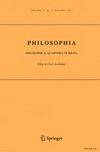良心的重要性和复杂性
IF 0.5
4区 哲学
0 PHILOSOPHY
引用次数: 0
摘要
良心的概念继续在我们的伦理推理中发挥核心作用,以及在许多领域,包括战争,关于医学伦理,宗教自由和良心反对的公共和哲学辩论中发挥核心作用。尽管这种持续的相关性,良心本身的性质在最近的哲学文献中仍然是一个相对被忽视的话题。在本文中,我讨论了这个概念的一些历史背景,并概述了任何令人满意的良心解释所需要的基本特征及其对连贯的道德心理学的意义。很明显,良心是一个复杂的概念,它拒绝被还原为它的任何一个组成特征。在这样做的过程中,我批评了最近对良心的描述,这些描述对这些复杂性的关注不够,因此对良心在道德推理中的合法作用得出了错误的结论。我还讨论了各种良心扭曲的重要性,比如我称之为“狂热的良心”。澄清良心的概念有助于我们避免道德心理学中的概念混淆,以及在理论和实践中对良心反对的理解中对这一概念的误用。本文章由计算机程序翻译,如有差异,请以英文原文为准。
The Significance and Complexity of Conscience
Abstract The concept of conscience continues to play a central role in our ethical reasoning as well as in public and philosophical debate over medical ethics, religious freedom, and conscientious objection in many fields, including war. Despite this continued relevance the nature of conscience itself has remained a relatively neglected topic in recent philosophical literature. In this paper I discuss some historical background to the concept and outline the essential features required for any satisfactory account of conscience and its significance for a coherent moral psychology. It will become clear that conscience is a complex concept resisting reduction to any one of its component features. In doing so I critique recent accounts of conscience which have been insufficiently attentive to these complexities and as a consequence have drawn mistaken conclusions about the legitimate role of conscience in moral reasoning. I also discuss the significance of various distortions of conscience such what I call “the fanaticised conscience”. Clarifying our concept of conscience helps us avoid both conceptual confusion in moral psychology and misapplications of the concept in our understanding of conscientious objection both theoretically and in practice.
求助全文
通过发布文献求助,成功后即可免费获取论文全文。
去求助
来源期刊

PHILOSOPHIA
PHILOSOPHY-
CiteScore
0.90
自引率
20.00%
发文量
141
期刊介绍:
Founded in 1971, Philosophia is a much-respected journal that has provided a platform to many well-known philosophers, including Kenneth Arrow, A.J. Ayer, Roderick Chisholm, Bas van Fraassen, William Frankena, P.T. Geach, Alan Gewirth, Jaakko Hintikka, Richard Popkin, W.V.O. Quine, Gilbert Ryle, Marcus Singer, Peter Singer, J.J.C. Smart, P.F. Strawson, and many others. Philosophia also published papers of Ludwig Wittgenstein and Rudolf Carnap.
Philosophia is an international journal in scope, submissions and readership. The journal publishes contributions fitting within various philosophical traditions, but manifests a preference of the analytic tradition in the broad sense of commitment to clarity and responsibility.
Besides papers in the traditional subfields of philosophy and its history, Philosophia also publishes work on topical subjects such as racism, silence of God, terrorism, the nature of philosophy, emotion, AIDS, scientific discovery, punishment, modality, and institutional theory of art.
Philosophia welcomes a wide range of contributions to academic philosophy, covering all fields of philosophy. Contributions to the journal may take the form of topical papers, philosophical surveys of literature, symposia papers, short discussion notes, puzzles, profiles, book reviews and more extensive critical studies of new books. The journal includes a ''books revisited'' section where a book and its impact are reconsidered a decade or more after its appearance. Double-blind review procedure The journal follows a double-blind reviewing procedure. Authors are therefore requested to place their name and affiliation on a separate page. Self-identifying citations and references in the article text should either be avoided or left blank when manuscripts are first submitted. Authors are responsible for reinserting self-identifying citations and references when manuscripts are prepared for final submission.Please read our Editorial Policies carefully before you submit your paper to this journal https://www.springer.com/gp/editorial-policies
 求助内容:
求助内容: 应助结果提醒方式:
应助结果提醒方式:


